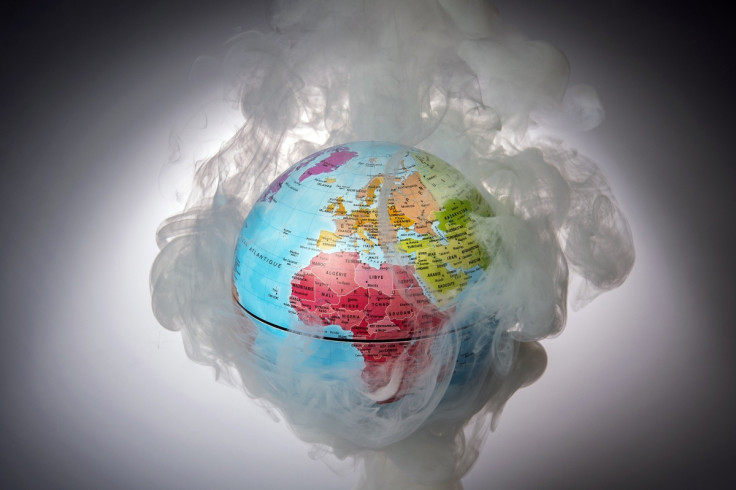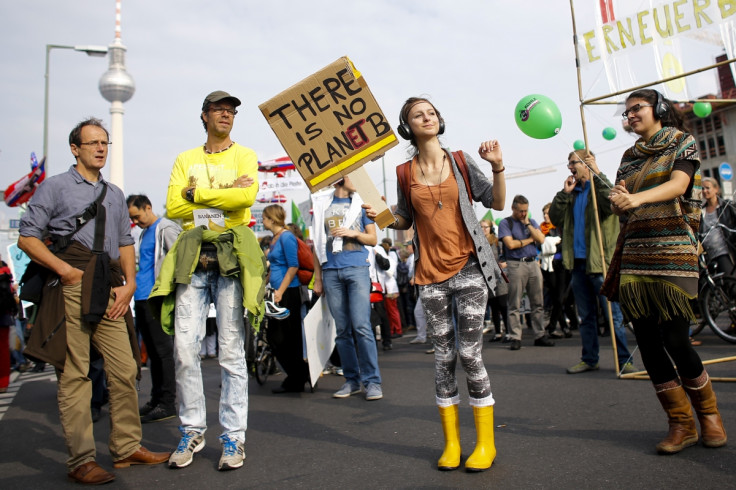Paris climate change talks: Why are some people global warming deniers?

Climate change denial, or doubt, or scepticism — however you want to brand it — is a broad spectrum. At the extreme end are those with enough religious fervour, perhaps delusion, to believe God will sort climate change out. At the moderate end are those who see the climate change campaign as a political effort, led by left-wing progressives, to make the state bigger.
"One of the most common explanations for understanding public attitudes about climate change focuses on political factors," Cary Funk, associate director of research on science and society at the US-based Pew Research Center, told IBTimes UK. "There are strong differences about whether climate change is occurring, and attitudes about ways to address climate change, by party and ideology. The political divisions in views about these issues grew over the course of time, a pattern that has also occurred on a wide range of attitudes and values."
Any scientific evidence attached to the denialist camp, derided by opponents as pseudoscience, is not an end in itself, but a vehicle for other grievances about the broad scientific consensus that humans are contributing substantially to climate change by their carbon emissions. For example, many on the conservative right are not motivated necessarily by scientific truth, but by discrediting the science underpinning what they say is a massive land grab by governments.
Research into US attitudes by the pollster Pew was revealing. Of those who were liberal in political ideology, 76% said they thought climate change was because of human activity. Of conservatives, just 29% thought the same, while 30% put climate change down to natural patterns and 57% said there was no solid evidence that the Earth was getting warmer. Perhaps most telling about the apparent rise of denialism is the shift in attitudes between over the past few years.
According to Pew, just 11% of all US adults said there was no solid evidence of global warming; 36% said that changes were natural; and 49% said humans were the cause. By 2014, this had changed in the denialists' favour: 50% blamed humans, a small increase, and 23% said natural patterns, but 25% said there was no solid evidence of global warming – a sharp rise. In the UK, polling by Cardiff University and market researcher Ipsos MORI found that nine in 10 people believed climate change was happening, with 84% blaming human activity. Just 13% of Britons did not think it was caused by humans, down sharply from 21% in 2011.
With the Paris climate change talks ready to snatch attention – somewhat overshadowed, however, by the Islamic State (Isis) terror attacks in Paris – denialists will be preparing to pinch some of it. But if there is such a consensus – 97% of the world's environmental scientists agree, according to one controversial study – what is fuelling this denialism?
A University of Oxford paper from 2013, The Political Economy of Climate Change Policy, found that countries in which the public was aware of the causes of climate change were significantly more likely to adopt climate change mitigation policies than countries in which public knowledge was low.
"Public knowledge of climate change, in turn, is shaped by a number of key factors, including the threat posed by climate change in a particular country, the national level of education and the existence of a free media," said the report, written by Franklin Steves and Alexander Teytelboym.
What's more, a strong carbon-intensive industry in a country is, unsurprisingly, a "major deterrent" to governments introducing green policies designed to tackle climate change. Economies that rely on this industry are in a sort of Fossil Fuel Faustian Pact. Much denialist activity is funded by those with a vested commercial interest in opposing any green agenda, such as oil companies. They plough billions into the lobbyists who encircle governments. While the green lobby is also well funded, it does not carry with it corporate wealth on the scale of the fossil fuel giants backing denialism.
Libertarians and conservatives generally want a smaller state and more personal freedom, and so are inherently distrustful of the state and branches of the establishment. So when some see organisations such as the Intergovernmental Panel on Climate Change (IPCC) saying there is no debate about climate change because the science is sewn up, and their governments putting up taxes and adding more regulation because of this, it offends everything they believe in.
They are, by political instinct, fiercely opposed. They do not trust the scientists and they do not trust the politicians. From that starting point, why would they accept the legitimacy of climate change science and policies to mitigate human-caused damage to the environment? To the paranoid Tea Party crowd in the US, for example, this is all tantamount to a government conspiracy against the liberty of the people.

"Ultimately, it will not matter if people in government cynically promote the theory that human activity is destroying the global climate as a means of taking control of your life, or if they take control of your life because they sincerely believe human activity is destroying the global climate," wrote the conservative columnist Terry Jeffrey. "Either way, government will control of your life."
"This so-called climate science is just ridiculous," said Kelly Khuri, founder of the Clark County Tea Party Patriots, to The New York Times in 2010. "Carbon regulation, cap and trade, it's all just a money-control avenue [...] Some people say I'm extreme, but they said the John Birch Society was extreme, too."
There are veins of this opinion running through the British debate, too. "It cannot be left to one part of the political spectrum to dictate the solution – and some of the loudest voices have approached the issue from a left-wing perspective," Amber Rudd, the Conservative UK energy secretary, said in a speech. "So I can understand the suspicion of those who see climate action as some sort of cover for anti-growth, anti-capitalist, proto-socialism. But it was Margaret Thatcher who first put climate change on the international agenda."
For some Christians, particularly in the US, the urgency of dealing with climate change is moot because God has created a natural system that is more powerful than anything humans can do. So even if humans are damaging the climate, divinely-created nature will override what we are doing. This is argued by an American group called the Cornwall Alliance.
"As the product of infinitely wise design, omnipotent creation, and faithful sustaining (Genesis 1:1–31; 8:21–22), Earth is robust, resilient, self-regulating, and self-correcting," says the Christian organisation's website. "Although Earth and its subsystems, including the climate system, are susceptible to some damage by ignorant or malicious human action, God's wise design and faithful sustaining make these natural systems more likely – as confirmed by widespread scientific observation – to respond in ways that suppress and correct that damage than magnify it catastrophically."
Other people think climate change may actually be, on balance, a good thing. So their denialism is less about rejecting the science that shows it exists and that humans are the cause of global warming, and more about opposing the "alarmism" attached to it – we simply have to adapt, they say. These are the optimists. The author and columnist Matt Ridley bemoaned in The Spectator the "bovine logic" of the debate so far: that investment in expensive but ineffective green policies to fight back is the only answer.
"There is an alternative: accepting that the planet is warming, and seeing if we can adjust accordingly," Ridley wrote. "Adaptation means investing in flood defences, so that airports such as Schiphol can continue to operate below existing (and future) sea level, and air conditioning, so that cities such as Houston and Singapore can continue to grow despite existing (and future) high temperatures. It means plant breeding, so that maize can be grown in a greater range of existing (and future) climates, better infrastructure, so that Mexico or India can survive existing (and future) cyclones, more world trade, so that Ethiopia can get grain from Australia during existing (and future) droughts."
Others take a similar line. Bjorn Lomborg is a political scientist and author of The Skeptical Environmentalist. He accepts mainstream climate science but rejects policies which target the reduction of carbon emissions by coercing companies through regulation and financial penalties. "Our approach to climate change is broken," Lomborg wrote for Project Syndicate. "The Paris agreement will likely cost the world at least a trillion dollars each year, yet deliver only a tiny reduction in temperature by the end of the century. We should accept that trying to make fossil fuels too expensive to use will never work. Instead, we should make green energy so cheap that nobody can resist it."
Climate change is a complex debate. There is a scientific consensus that humans are causing at least some, if not most, of the warming of our planet. Even some of those on the sceptical side agree with this. Yet there remains a debate because the denialists are as entrenched in their views as their opponents. As it stands, the greenies are winning. But with a world distracted by more immediate and tangible threats – namely, terrorism – the environment may slip down the list of our priorities. An opportunity, perhaps, for the denialists to make some political capital.
© Copyright IBTimes 2025. All rights reserved.






















